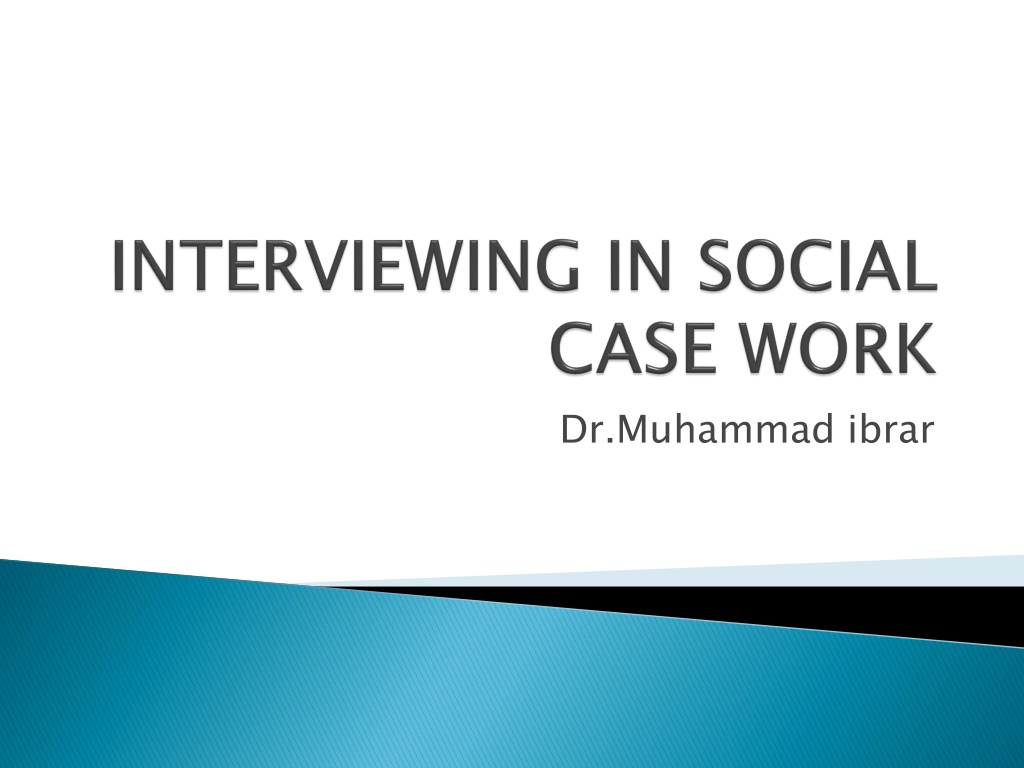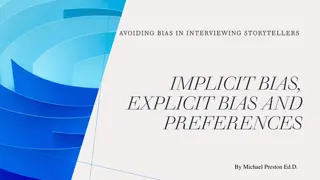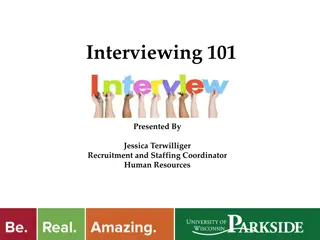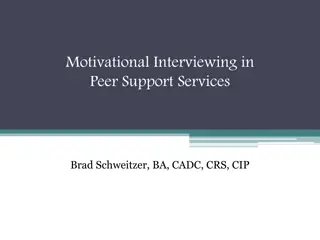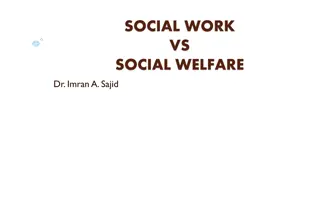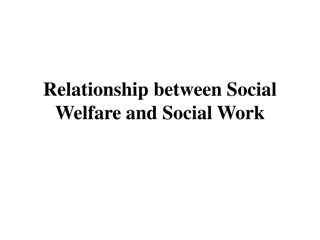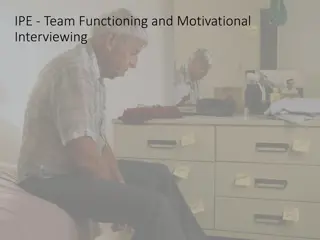Understanding the Art of Interviewing in Social Work
Interviewing in social work is a crucial tool that enables social workers to build rapport, gain client cooperation, and understand their needs. Different types of interview patterns, such as structured and unstructured interviews, play a key role in obtaining essential information and providing support to clients.
Download Presentation

Please find below an Image/Link to download the presentation.
The content on the website is provided AS IS for your information and personal use only. It may not be sold, licensed, or shared on other websites without obtaining consent from the author. Download presentation by click this link. If you encounter any issues during the download, it is possible that the publisher has removed the file from their server.
E N D
Presentation Transcript
For important activity. By interviewing, we mean a meeting informal) between two or more persons for a specific purpose. It is an art which is used in every situation for better understanding and better relationships between the interviewer (Worker) Interviewing is an important tool in casework and becomes an essential component. social workers, interviewing is a very or conference (may be formal or and the interviewee (Client). in interviewing, effective listening
Interviewing is the foundation on which theory and practice of social case work is based because without possible information about the client nor can the client gain any confidence in the worker. The only way establish rapport with the client in order to win his confidence. Interview means face to face conservation, or questioning, information /problems in question. interview, the worker cannot get all to ensure successful interviewing is to for to the purpose of analyze draw out understand and issues
In social case work, the main purpose of the interviewing are: To win confidence and cooperation of the client. To obtain knowledge of the situation. To study the person, his problems, his needs and resources. To understand another person.
To make the person understand you. To give the client an opportunity of emotional release, a feeling of security and to gain insight into his problems and some of their causes. To explain the client the assistance which is available and what is expected from him.
The various types of interview patterns are discussed as below: On the basis of the manner in which they are conducted, interviews are generally of the following types: 1) Structured Interview 2) Unstructured Interview 3) Mixed or Depth Interview Structured Interview 1) 2) Unstructured Interview 3) Mixed or Depth Interview
It is also known as controlled, guided or directive predetermined interviewer is asked to get the answers to those questions only. He/she generally does not add anything from his own side. The language too is not changed. He/she can only interpret the statement wherever necessary. interview. questionnaires Under this a used. The
It is also known as uncontrolled or non- directive predetermined questions are used in this type of interview. The interviewers may develop questions as the interview proceeds. It is generally held in the form of free discussions. The basic objective of this method is to get the client express himself/herself freely. interview. No direct or
It unstructured types of interviews. Under this method himself/herself but at the same time structured questions provide a base of information to the interviewers to compare the clients. On interviews are of following types, some are mainly directed towards obtaining information, some mostly towards giving help. Most, however involve a combination of the two. is a combination of structured and the client is free to express the basis of the purposes they serve,
There are three basis types of Case Work interviews depend on the purposes they serve: 1. Informational or social history interviews. 2. Diagnostic interviews. 3. Therapeutic interviews.
Informational interviews are designed to obtain background or life history material related to the personal or social problem faced by a client. The purpose is to seek information that will enable the worker (or agency) to better understand the client so that decisions can be made regarding what kind of services should be provided. People interviewed or contacted include the client, parents, friends, other relatives
Employers, police department, school and other agencies having contact with the client. A social history usually has face sheet information (e.g. name, age, occupation and so on) and then information about presenting question of problem, early childhood experiences and development, family background, school performance, marital history, employment history, contact with other agencies and general impressions.
Diagnostic interviews primarily differ from informational interviews in that the questions asked in diagnostic interviews are more focused on making specific decisions involving human services. For example, a vocational rehabilitation counselor interviews a physically handicapped client to determine eligibility for a range of services including financial assistance, vocational training and workshop for the display.
The purpose of therapeutic interview is to help clients make changes, or to change the social environment to help clients function better, or both. Examples of the first type include the following: A parent who is shy may be counseled on how to be more assertive(confident). A client who is depressed, or lonely, or suicidal may be counseled on how to better handle such problem. A client on probation may be counseled on how to apply for and find a job.
One wishes that there was a outline of an ideal or perfect interview available to the caseworker which could serve as ready reference before starting the interviewing process. It is impossible to have a comprehensive list of perfect rules for conducting a casework interview. However an attempt has been made here to list the rules of interviewing which if followed/kept in mind by the caseworker, will ensure a smooth flow of interaction between the client and the caseworker.
Effective interviewing is possible only when it is grounded in a basic understanding of human nature, behavior and motivation. The setting of interview is of vital significance. It should ensure some degree of privacy, provide for an atmosphere which is relaxed and physically comfortable, should be free of disturbing noise and interruptions. Provide a setting with which the interview can get off to a good start.
The length of the interview should be determined according to the purpose of the interview. It should be neither too long nor too short. The client should be put at ease, stimulated to talk freely about his/her problems, helped to organize his/her own confused thoughts and feelings about his/her difficulties. Help the client to relax, which is not possible, if you are not relaxed. The relationship between the interviewer and interviewee is of utmost importance in casework. The interviewer must never forget the impact that her own personality, appearance and manner may be having on the client.
Talk in a language understood by the client, begin where the client is and proceed at the pace of the client. The interview must always be adapted to the emotional and intellectual needs of the client. Be a warm, receptive(interested) and patient listener. Competent listening on the part of the caseworker requires minimal attention to ones own concentration on what the client is experiencing and expressing. A good interviewer is always a good listener and a keen observer. thoughts and feeling and maximum
Listen to silence for it can be more suggestive than words. You should know how to respond and manage break and silence. Do not be in a hurry to fill the gap created by silence because an unwarranted or quick intervention may leave a vital part of the story forever unsaid. A decent respect be shown to silence. Master the fine art of questioning. The type of question asked should be in accordance with the purpose of interview. The wording is important but equally important is the tone of voice in which they are put. Framed in simple words, the questions should encouraging tone is better than an condemning and suspicious one. be neither very few nor too many. A
To understand what is said, understand what is not said, non-verbal behavior cannot be ignored. Often it can be a more effective a message conveyor than the spoken words. People do not always say what they mean or act as they feel. Look for bodily tensions because these non-verbal signals may supplement or contradict what the client is saying and thereby help you to read between the lines. Have a high level of awareness of your own feelings and emotions, biases and discrimination should be kept outside of the interview as they have no place in a professional interview.
The interviewing in casework should be a reciprocal proposed meaning of the communication should be received and understood by both parties. The client should be included as an active participant in the interviewing process. Acknowledge determination. Direct your activities in the interviewing process towards promoting self- determination and participation. (give and take) process. The the client s right to self-
